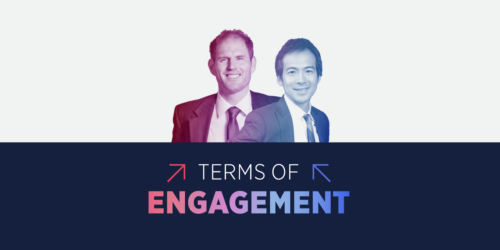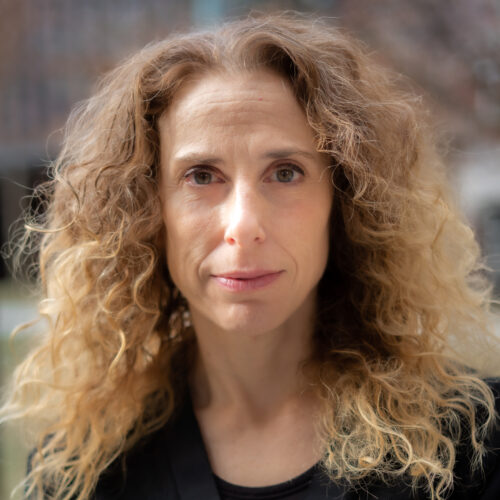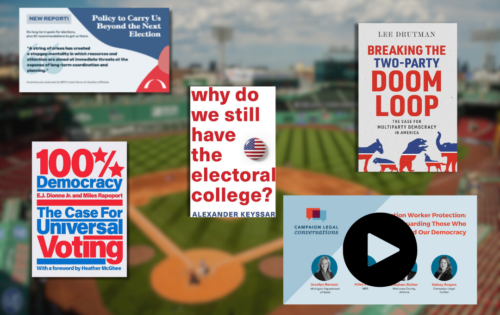Over the past few years, several books and reports have chronicled the threats to our democracy and what they might portend. Now, what interests Ash Center Senior Researcher in Democratic Practice Tova Wang most is how we meet those challenges.
In this curated reading list, Wang highlights books, reports, and webinars that address how we can build a more inclusive democracy — from shining a light on work happening at the state level to sharing ideas for big structural change over the long term.
As we look towards a historic November election, the list below was created for students, scholars, and individuals interested in learning how we can improve our elections, expand voting rights, and enhance our democracy.
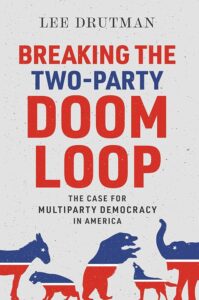
Lee Drutman, New America Senior Fellow and author of several studies looking at elections, provides the history of our party politics and its emergence into a rigid two-party system. Drutman makes the most compelling case I’ve read for election reform that would produce a multiparty system that spans the political and ideological spectrum, such as proportional representation.
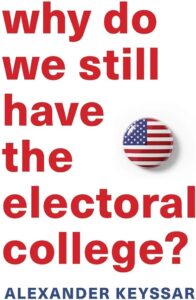
On the topic of big, structural election reform, Harvard Kennedy School Professor Alex Keyssar, the country’s leading historian on American voting rights, in this book, describes how the Framers got to the Electoral College system. It’s a story that will surprise readers and bring a whole different perspective to how we got this and other constitutional provisions we now take as enshrined in our system. Keyssar takes readers through the tortured and fascinating history of the attempts to reform the Electoral College, and how efforts are going forward today.
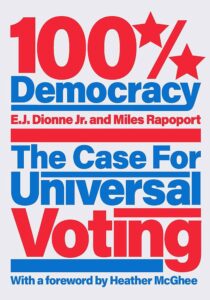
In this book, authors Miles Rapoport, a long-time organizer and leader; and well-known Washington Post columnist EJ Dionne, make a convincing case for implementing a mandatory – or as they accurately call it “universal” – voting in the United States. While upon first impression this may seem like a remote reform to consider, after reading it you may become a believer that, if fairly implemented as they propose, a system of this kind is a sensible way to increase turnout, create a more representative electorate, decrease voter suppression, and improve the nature of political campaigns. They carefully address objections to the proposal and have well-considered answers that might change your mind.
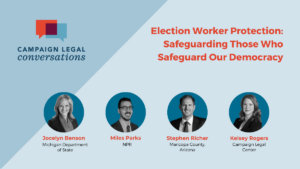
It’s useful to understand the challenges to election administration from those who know it best – election administrators! Featuring Stephen Richer, the embattled director of elections in Maricopa County, this webinar has the extra benefit of having been hosted by the Campaign Legal Center, a legal and advocacy organization that has been working for years for fairer and more equitable elections.
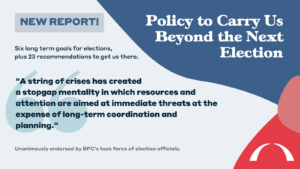
Over the last few years, the Bipartisan Policy Center issued some excellent reports looking at long-term ways to think about fixing our system of elections – beyond what we need to do for 2024. This report takes the approach of considering, “not just the next election but the next 100: to think long term about where we want our democracy to be for future generations, and what policy changes must be made now to get us there.”

Among the other great election reform successes that pro-voter advocates have achieved, the success of the movement to restore voting rights for people previously convicted of a felony is extraordinary. This report describes how this has been accomplished in state after state and the potential impact of providing hundreds of thousands of citizens the right to vote.
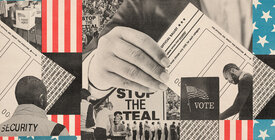
For people who are interested in learning some of the most effective recommendations for addressing problems and threats to the 2024 elections, this report from the Brennan Center is a great resource. This report discusses potential threats to the election such as disinformation, harassment of election officials, and cyberattacks, and how local, state, and federal governments work together to address them.

In this report, I and a team of co-researchers look at an innovative way to provide polling access to voters while also making voting more fun: using professional sports stadiums and arenas as polling places. A huge number of pro football, basketball, and baseball facilities were used for voting in 2020. We found that these spaces made exceptional polling places that served the needs of voters and election administrators and were great experiences for the teams. As we continue this work, the hope is that stadium and arena voting will appeal to a wide range of voters and increase participation.
